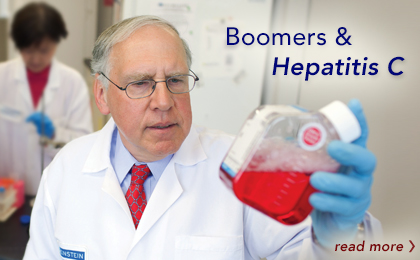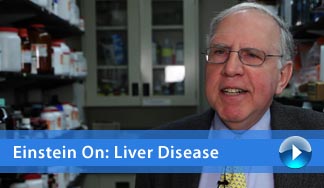 The interdisciplinary Marion Bessin Liver Research Center, established in 1974 with support from the National Institute of Diabetes and Digestive and Kidney Diseases (NIDDK), conducts scientific investigation to understand:
The interdisciplinary Marion Bessin Liver Research Center, established in 1974 with support from the National Institute of Diabetes and Digestive and Kidney Diseases (NIDDK), conducts scientific investigation to understand:
- fundamental mechanisms of normal liver function
- alterations in these functions resulting from metabolic disorders, genetic diseases, acute and chronic liver injury, hepatitis virus infection, hepatic fibrosis and liver cancer
- ways to overcome these abnormalities using state-of-the-art methods of genetic engineering, gene therapy and liver cell transplantation
By bringing excellent basic scientists into disease-related research together with hepatologists interested in fundamental mechanisms of hepatic dysfunction, we believe that imaginative approaches to basic cell biology, pathophysiology, diagnosis, treatment and prevention of liver disease will emerge. There are three major areas of research emphases.
The Center is comprised of an administrative core, a clinical component, and four research core facilities to support investigators from twelve departments of the medical school. These investigators have broad expertise touching on virtually all areas of biomedical research, including:
- anatomy and structural biology
- biochemistry
- cell biology
- developmental molecular biology
- genetics
- medicine
- microbiology and immunology
- molecular pharmacology
- neuroscience
- pathology
- pediatrics
- radiation oncology
 The Liver Research Center has a strong pilot and feasibility study program to support young investigators and develop new areas of research by established investigators. It is the focus of an active research-oriented education program (research seminars, visiting scientists, pathobiology sessions and work-in-progress discussion groups), and has extensive collaborative studies with investigators in other institutions.
The Liver Research Center has a strong pilot and feasibility study program to support young investigators and develop new areas of research by established investigators. It is the focus of an active research-oriented education program (research seminars, visiting scientists, pathobiology sessions and work-in-progress discussion groups), and has extensive collaborative studies with investigators in other institutions.
The Center is governed by an executive committee, and advised and reviewed by a scientific advisory committee comprised of leading hepatology research scientists from other institutions.